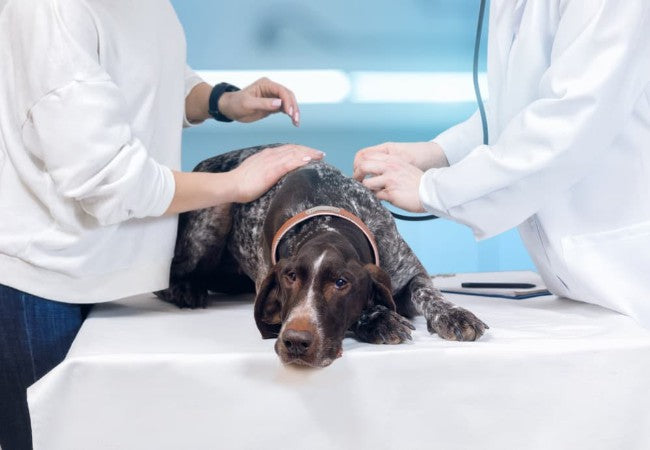Blastomycosis in Dogs: Vet-Approved Causes, Symptoms & Treatments (2025 Guide) 🐶💊

In this article
Blastomycosis in Dogs: Vet-Approved Causes, Symptoms & Treatments (2025 Guide) 🐶💊
By Dr. Duncan Houston BVSc
As a veterinarian, I occasionally encounter cases of blastomycosis in dogs, a serious condition that can significantly impact a dog's health. Understanding this condition is crucial for early detection and effective treatment. This comprehensive guide aims to educate pet owners on the causes, symptoms, and treatment options for blastomycosis in dogs.
🧬 What Is Blastomycosis?
Blastomycosis is a systemic fungal infection caused by the organism Blastomyces dermatitidis. This fungus thrives in moist, acidic soils rich in organic matter, particularly near bodies of water such as rivers, lakes, and swamps. Dogs become infected by inhaling airborne spores released when contaminated soil is disturbed. Once inhaled, the spores transform into yeast forms that can disseminate throughout the body, affecting various organs.
🌍 Geographic Distribution
Blastomycosis is most prevalent in certain regions, including:
- 🌊 The Mississippi, Ohio, Missouri, and Tennessee River valleys
- 🌾 The Great Lakes region
- 🍁 Parts of Canada, including Ontario, Manitoba, and Quebec
Dogs residing in or traveling to these areas, especially those that spend time outdoors, are at increased risk.
⚠️ Symptoms of Blastomycosis
Clinical signs vary depending on the organs involved. Common symptoms include:
- 💨 Respiratory Issues: Dry, harsh cough; difficulty breathing; nasal discharge (often bloody)
- 🩸 Skin Lesions: Draining nodules or ulcers, particularly on the face, nose, and limbs
- 🌡️ Fever: Elevated body temperature
- 📉 Weight Loss: Unintended loss of body weight
- 🛌 Lethargy: Decreased energy levels
- 👁️ Ocular Issues: Inflammation, redness, or blindness
- 🦴 Lameness: Pain or difficulty walking due to bone involvement
- 🧠 Neurological Signs: Seizures or disorientation if the central nervous system is affected
Early detection is crucial. If your dog exhibits any of these signs, consult your veterinarian promptly.
🩺 Diagnosing Blastomycosis
Diagnosis involves a combination of clinical evaluation and diagnostic tests:
- 🔬 Cytology: Microscopic examination of samples from skin lesions, lymph nodes, or respiratory secretions to identify the yeast form of the fungus
- 🧪 Antigen Testing: Detection of fungal antigens in urine or blood samples
- 🖼️ Imaging: Chest radiographs (X-rays) to assess lung involvement
- 🔍 Biopsy: Tissue sampling for histopathological examination
Accurate diagnosis is essential to differentiate blastomycosis from other conditions with similar presentations, such as bacterial infections or cancer.
💊 Treatment Options
Treatment typically involves prolonged antifungal therapy:
- 💊 Itraconazole: The most commonly prescribed oral antifungal medication, administered for a minimum of 60 to 90 days
- 💉 Amphotericin B: An intravenous antifungal used in severe cases or when rapid response is necessary
- 💊 Fluconazole: An alternative oral antifungal, sometimes used in conjunction with other medications
Supportive care, including hospitalization, oxygen therapy, and fluid management, may be required in severe cases. Regular monitoring through blood tests and imaging is essential to assess treatment response and detect potential side effects.
🛡️ Preventing Blastomycosis
While complete prevention is challenging, especially in endemic areas, certain measures can reduce the risk:
- 🚫 Limit Exposure: Avoid allowing your dog to dig or play in moist, wooded, or swampy areas
- 🏞️ Stay on Trails: Keep your dog on designated paths during hikes or outdoor activities
- 🧼 Hygiene: Clean your dog's paws and coat after outdoor excursions
- 🩺 Regular Check-ups: Routine veterinary visits for early detection of potential issues
📱 Support and Resources
If you suspect your dog has blastomycosis, consult your veterinarian promptly. For additional support:
- Ask A Vet: Access professional veterinary advice through the Ask A Vet platform.
- Download the Ask A Vet App: For quick access to veterinary support, download the Ask A Vet app.
Early diagnosis and appropriate treatment can significantly improve your dog's quality of life.
🐾 For more expert advice and pet care tips, visit AskAVet.com.






